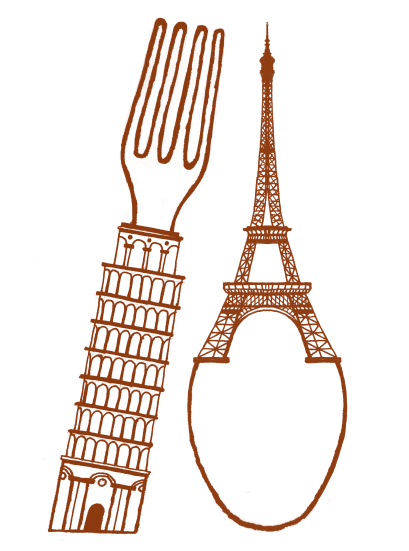Le présent de l'indicatif irrégulier - A second lesson on the present tense in French. In this lesson, you will find a revision of the regular verbs and the rules of the irregular verbs.
Hello everyone. Welcome back to another lesson on The Languages Kitchen! Today, we have another important topic which we've already started talking about a couple of weeks ago. This lesson will be the continuation and a build-up of that lesson. We're talking about le présent de l'indicatif irrégulier. So, before immersing yourself in this lesson, make sure you first follow the first lesson on this topic - le présent de l'indicatif régulier here.
1. Première Étape
The first two verbs we've learnt on this journey, Être and Avoir are two irregular verbs. These verbs are used on a daily basis so it's imperative that you learn these two verbs before anything else. You can also go back and have a look at the lesson we dedicated to these two verbs here.
Être
Je suis
Tu es
Il/Elle/On est
Nous sommes
Vous êtes
Ils/Elles sont
Avoir
Je/J' ai
Tu as
Il/Elle/On a
Nous avons
Vous avez
Ils/Elles ont
2. Deuxième Étape
In the first lesson on the present tense, I had already mentioned some of the verbs that only have a few irregular endings. We have already mentioned Envoyer (to send) and Manger (to eat). In Envoyer, the Y disappears in some of the cases and in Mager, an extra E appears on the first person plural (nous).
Another example is Commencer (to start). Again, the first person plural has a Ç instead of C. In the next two verbs, Épeler (to spell) and Jeter (to throw), there is a double letter in some cases. While, in the last example Acheter (to buy), we change the E to an È.
Envoyer
J' envoie
Tu envoies
Il/Elle/On envoie
Nous envoyons
Vous envoyez
Ils/Elles envoient
Nager
Je nage
Tu nages
Il/Elle/On nage
Nous nageons
Vous nagez
Ils/Elles nagent
Commencer
Je commence
Tu commences
Il/Elle/On commence
Nous commençons
Vous commencez
Ils/Elles commencent
Épeler
J'épelle
Tu épelles
Il/Elle/On épelle
Nous épelons
Vous épelez
Ils/Elles épellent
Jeter
Je jette
Tu jettes
Il/Elle/On jette
Nous jetons
Vous jetez
Ils/Elles jettent
Acheter
J'achète
Tu achètes
Il/Elle/On achète
Nous achetons
Vous achetez
Ils/Elles achètent
3. Troisième Étape
Many of the verbs ending in -ER follow the rules, however, there is one verb which is highly used in the French language that is an irregular. The verb is Aller (to go).
Aller
Je vais
Tu vas
Il/Elle/On va
Nous allons
Vous allez
Ils/Elles vont
4. Quatrième Étape
A small group of -IR verbs add these endings: -e, -es, -e, -ons, -ez, -ent. Two examples of these verbs are Ouvrir (to open) and Offrir (to offer).
Ouvrir
J'ouvre
Tu ouvres
Il/Elle/On ouvre
Nous ouvrons
Vous ouvrez
Ils/Elles ouvrent
Offrir
J'offre
Tu offres
Il/Elle/On offre
Nous offrons
Vous offrez
Ils/Elles offrent
5. Cinquième Étape
A group of irregular verbs with two consonants before the -IR ending, the ending changes to: -s, -s, -t, -ons, -ez, -ent and the last consonant is removed in some cases. The following verbs are some good examples of this group - Dormir (to sleep), Partir (to leave) and Sortir (to go out).
Dormir
Je dors
Tu dors
Il/Elle/On dort
Nous dormons
Vous dormez
Ils/Elles dorment
Partir
Je pars
Tu pars
Il/Elle/On part
Nous partons
Vous partez
Ils/Elles partent
Sortir
Je sors
Tu sors
Il/Elle/On sort
Nous sortons
Vous sortez
Ils/Elles sortent
Other irregular -IR verbs are the modal verbs Pouvoir (to be able to), Vouloir (to want) and Savoir (to know).
Pouvoir
Je peux
Tu peux
Il/Elle/On peut
Nous pouvons
Vous pouvez
Ils/Elles peuvent
Vouloir
Je veux
Tu veux
Il/Elle/On veut
Nous voulons
Vous voulez
Ils/Elles veulent
Savoir
Je sais
Tu sais
Il/Elle/On sait
Nous savons
Vous savez
Ils/Elles savent
The following two -IR verbs are highly irregular: Tenir (to hold) and Venir (to come).
Tenir
Je tiens
Tu tiens
Il/Elle/On tient
Nous tenons
Vous tenez
Ils/Elles tiennent
Venir
Je viens
Tu viens
Il/Elle/On vient
Nous venons
Vous venez
Ils/Elles viennent
6. Sixième Étape
The endings for the irregular verbs in -RE verbs are -s, -s, -t, -ons, -ez, -ent. The following verbs are some examples - Boire (to drink), Vivre (to live) and Lire (to read).
Boir
Je bois
Tu bois
Il/Elle/On boit
Nous buvons
Vous buvez
Ils/Elles boivent
Vivre
Je vis
Tu vis
Il/Elle/On vit
Nous vivons
Vous vivez
Ils/Elles vivent
Lire
Je lis
Tu lis
Il/Elle/On lit
Nous lisons
Vous lisez
Ils/Elles lisent
Some other irregularities for a few more -RE verbs. Notice the extra S and T and the different ending for Vous in Dire (to say) and Faire (to do). Also in Faire, notice Ils/Elles. Some of these differences are also seen in Lire (to read) and Prendre (to take).
Dire
Je dis
Tu dis
Il/Elle/On dit
Nous disons
Vous disez
Ils/Elles disent
Faire
Je fais
Tu fais
Il/Elle/On fait
Nous faisons
Vous nfaites
Ils/Elles font
Lire
Je lis
Tu lis
Il/Elle/On lit
Nous lisons
Vous lisez
Ils/Elles lisent
Prendre
Je prends
Tu prends
Il/Elle/On prend
Nous prenons
Vous prenez
Ils/Elles prennent
This above is a simple explanation and some examples for you to follow. I hope this lesson gives you a better image of what the irregular verbs are like for the present tense in French. As you may have noticed, there are a few rules to follow, however, the best way to remember them is to practice and practice some more.
In fact, this won't be the last time we mention this tense and practice on worksheets. I will be popping more worksheets in the future on this topic for you to continue practising. Let's start with the first one for today. Go ahead and click the link below and download today's worksheet. Enjoy learning and if you have any questions, feel free to leave me a comment and I will get back to you asap.
